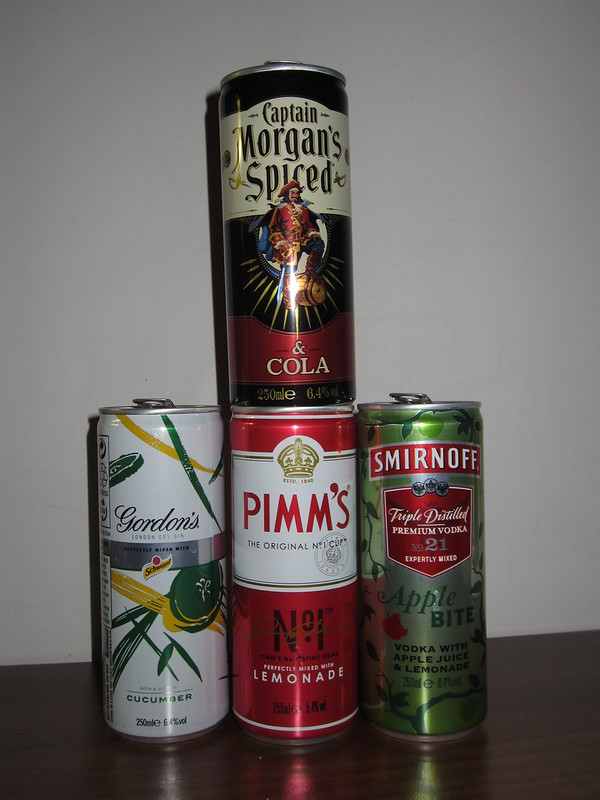Making & Selling Ready-to-Drink Cocktails in Florida

Ready-to-drink (RTD) or canned cocktails are growing in popularity. According to Grand View Research, the global RTD cocktails market is anticipated to grow at a compound annual growth rate of 12.1% from 2020 through 2027. Kevin Roberts, the executive vice president of supplier engagement for the alcohol distributor Breakthru Beverage Group, said “You have a convenience trend happening, you have a lifestyle thing happening, and then you have this can phenomenon.” (The Rise of Ready-to-Drink Cocktails)
RTD Cocktails Can be Made by Licensed Florida Manufacturers
Alcoholic beverage manufacturers in Florida can make RTD cocktails, provided they have the right manufacturing license for the type of alcohol. The key is the type (or types) of alcohol that are included in the products.
Florida wineries (holding the federal winery permit and state AMW license) can make and package RTD cocktails in which the alcoholic content is only from fruit wine or mead. Other than standard orange wine (OTSOW) is a versatile ingredient that is often used in the “mocktini” variety of RTD cocktails.
Florida breweries (holding the federal Brewer’s Notice permit and state CMB license) can make and package RTD cocktails in the category of malt beverages. This includes hard seltzers, which use sugar as a permissible substitute to malt.
RTD cocktails that include distilled spirits or any other alcoholic ingredient that is not wine or malt beverage can only be manufactured and packaged in Florida by a licensed distillery (holding the federal DSP permit and state DD or DD(CD) license).
Florida Distributors Must Have the Right Type of License for the RTD Cocktails’ Alcohol Class
Florida distributors that hold a federal wholesaler permit and a state JDBW (beer and wine only) distribution license are limited to handling RTD cocktails that are classified as wine or malt beverage, depending on their ingredients.
For RTD cocktails that contain distilled spirits or any other alcoholic ingredient, a Florida distributor must hold a state KLD (beer, wine, and spirits) distribution license.
Low-Proof RTD Cocktails Can be Sold by a Large Number of Florida Licensed Retailers
When it comes to retail sales of RTD cocktails, the amount of alcohol matters.
Special low-proof products—including distilled, mixed, or fermented products which contain less than 6% alcohol by volume (ABV)–may be purchased by licensed vendors holding a 2COP or 2APS license (that is, a beer or wine license). This means that a KLD licensed distributor can sell the products to beer-and-wine vendors. See Florida Statutes Section 564.06(5)(b) and Florida Administrative Code Rule 61A-3.050. This is what allows spirits-based RTD cocktails to be sold in convenience stores and grocery stores.
For RTD cocktails that contain 6% ABV or greater, the type of alcohol is controlling. Retailers with a 2COP or 2APS license can only selling high-proof RTD cocktails if the are in the category of wine or malt beverage. Any other type of high-proof RTD cocktails, including those containing distilled spirits, can only be sold by retailers that hold a 4COP or 4APS quote license.
Do you have questions about making or selling RTD cocktails in Florida? We’d love to discuss it with you. Contact us at contact@brewerlong.com to schedule a consultation.
Because we’re attorneys: This blog post is provided on an “as is” and “as available” basis as of the date of publication. We disclaim any duty to update or correct any information contained in this blog post, including errors, even if we are notified about them. To the fullest extent permitted by law, we disclaim all representations or warranties of any kind, express or implied with respect to the information contained in this blog post, including, but not limited to, warranties of merchantability, fitness for a particular purpose, title, non-infringement, accuracy, completeness, and timeliness. We will not be liable for damages of any kind arising from or in connection with your use of or reliance on this blog post, including, but not limited to, direct, indirect, incidental, consequential, and punitive damages. You agree to use this blog post at your own risk. Regarding your particular circumstances, we recommend that you consult your own legal counsel–hopefully BrewerLong.

